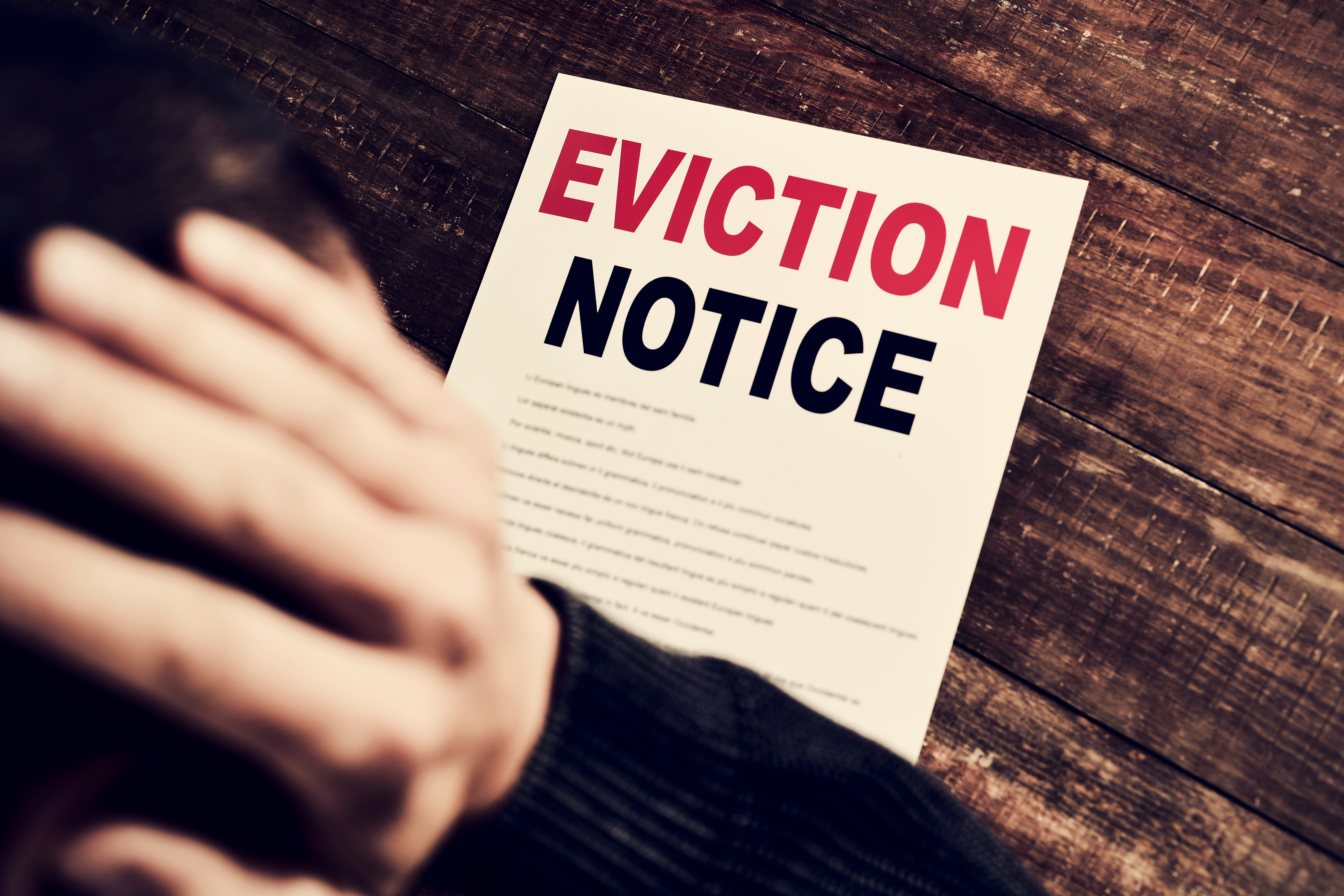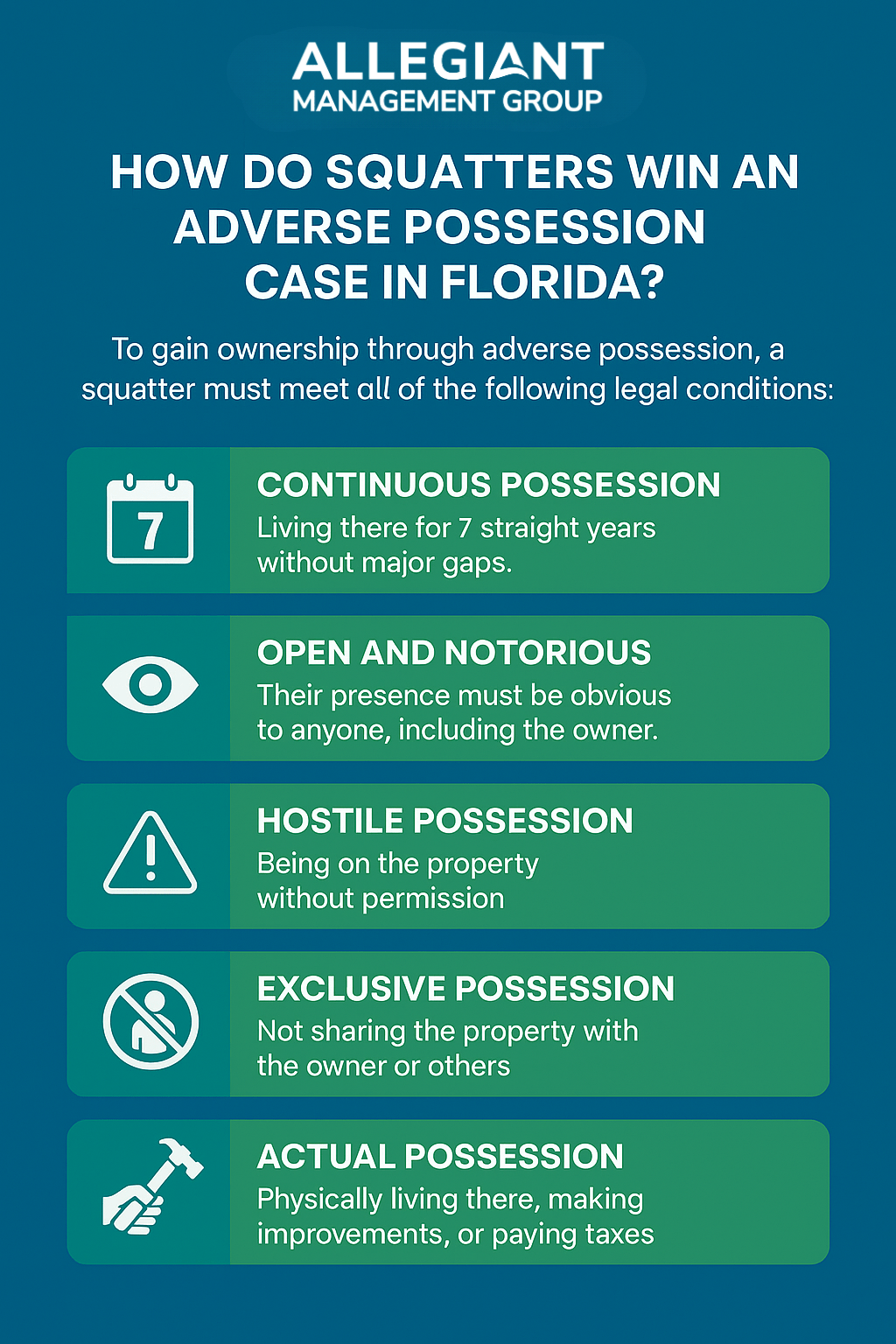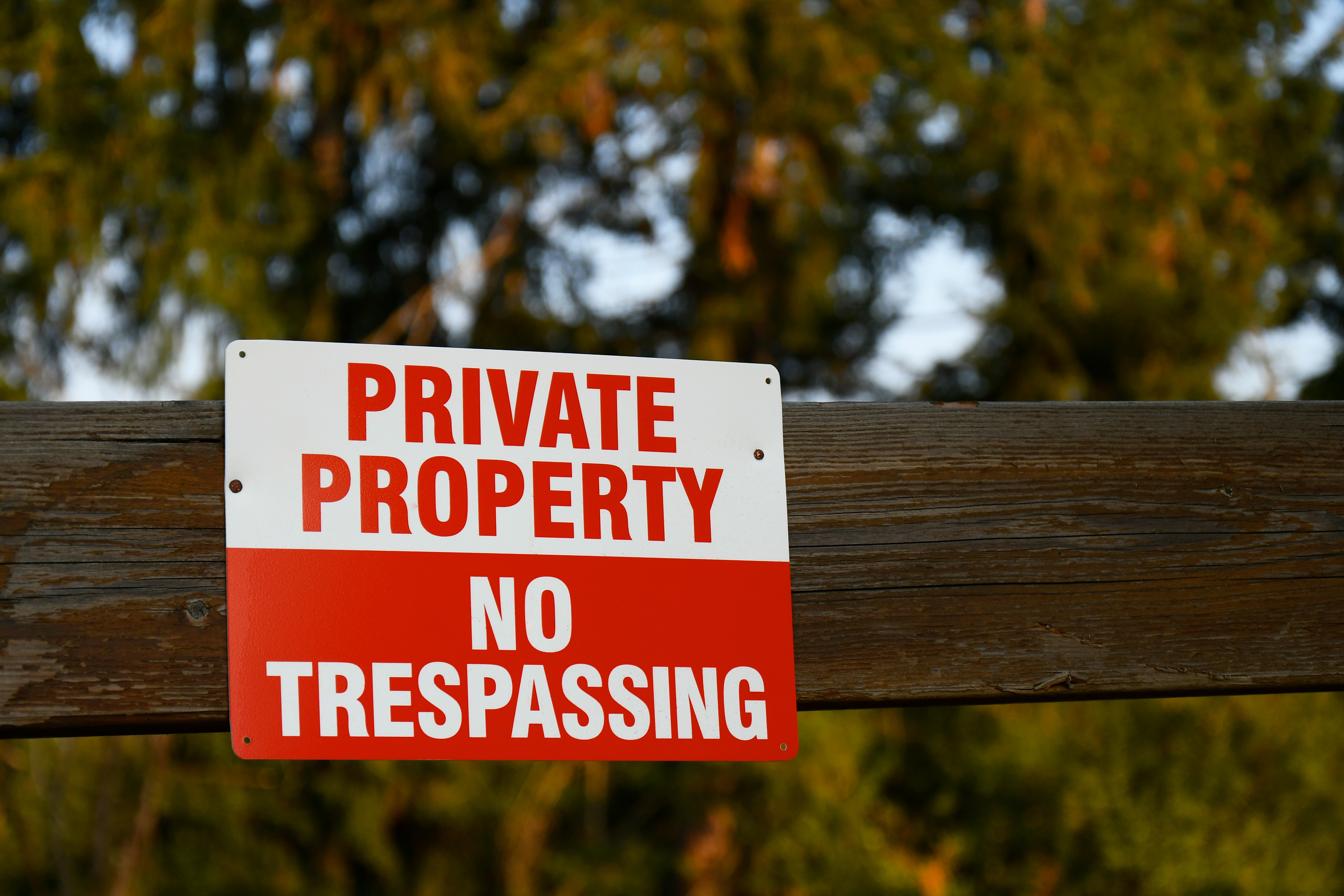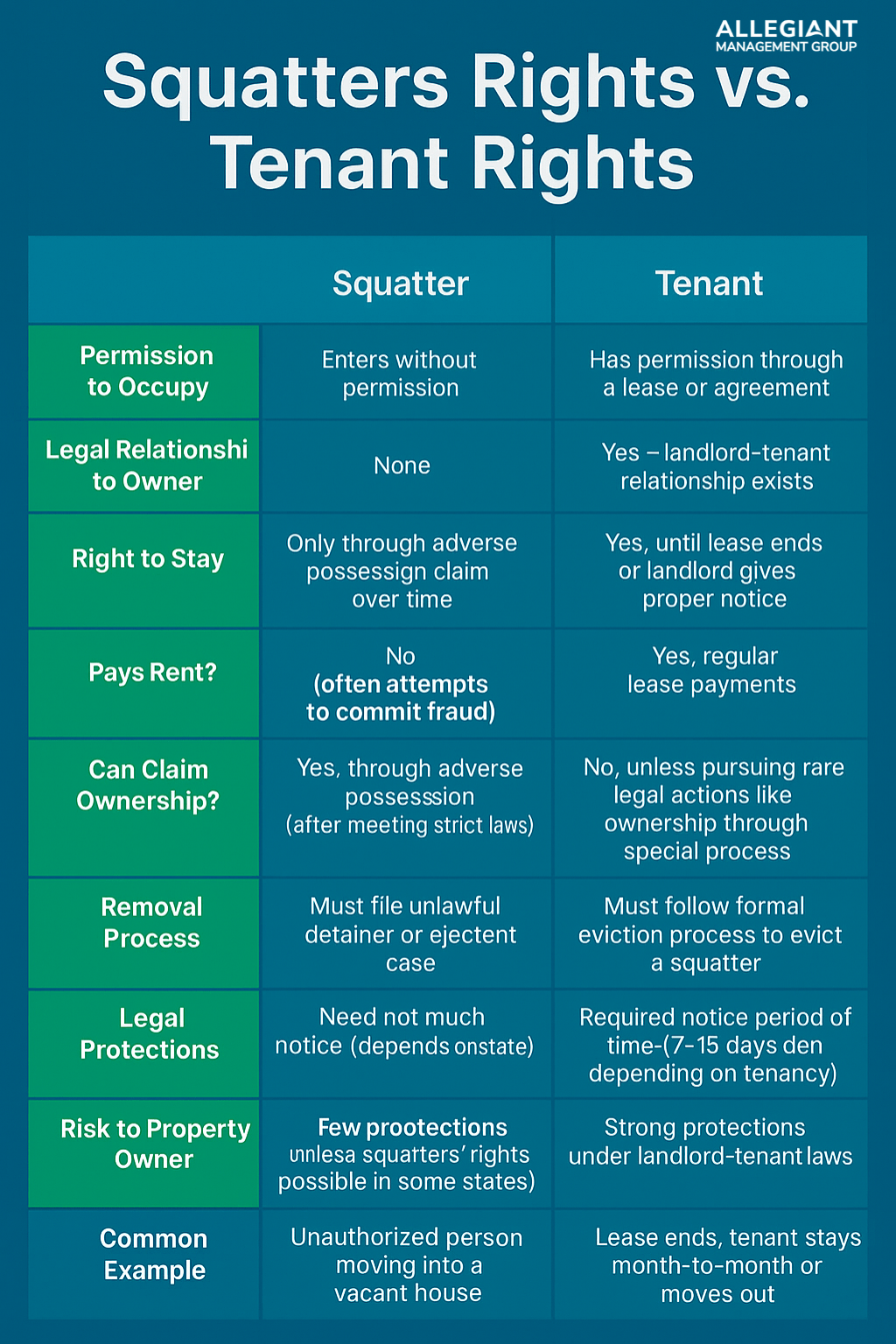Last Updated: July 21, 2025
📌 Table of Contents
- Please Define a Squatter
- How Squatters Can Claim Ownership
- Legal Criteria for Adverse Possession in Florida
- Tenant Without a Lease (Holdover Tenants)
- How Property Owners Can Protect Themselves
- “Squatters Rights vs. Tenant Rights” Comparison Chart
- How Can a Property Manager Assist in Protecting Property Owners?
- Protect Your Property with Allegiant Management Group
- Frequently Asked Questions (FAQs) - Why Squatters Rights in Florida
Are Squatters Right or are Squatters Wrong?
Squatters’ rights, also known as adverse possession, can confuse both property owners and tenants. These laws try to balance two goals: protecting property owners while giving people a chance to use abandoned land.
If you own real property in Florida, it’s important to stay informed. Knowing the laws can help you avoid losing your property to squatters. Prior to the 2024 Law, you would be stuck serving the squatter with an eviction notice.

Please Define a Squatter
A squatter is someone who lives in an empty or unused property without permission from the true owner.
At first, it sounds like simple trespassing. But under certain conditions, squatters may eventually gain legal rights to the property through a process called adverse possession.
A squatter might claim ownership if they:
Live on the property for a certain number of years
Improve or maintain the property
Pay property taxes
Treat the property as their own
If these actions happen over time without the owner’s interference, the squatter might have a legal case.
How Squatters Can Claim Ownership
It takes longer than 30 days to claim ownership. The rules for squatters’ rights change from state to state. In Florida, squatters can claim a property through requirements for adverse possession if they were occupying the property for at least 7 years up to 20 years. A statutory period, is required by the law.
Key terms to know:
Color of Title
When a squatter claims ownership without official documents. Adverse possession without color of title is difficult for the adverse possessor.
Unlawful Detainer
A legal action a property owner must file to remove a squatter (an unlawful detainer different from regular eviction).
Because these cases can be complicated, property owners should talk to a lawyer or work with a property management company to protect their rights.
Legal Criteria for Adverse Possession in Florida

To win an adverse possession law case, squatters must meet strict legal requirements:
- Continuous Possession
Living there for a period of time - 7 straight years without major gaps. - Open and Notorious Possession
Their presence must be obvious to anyone, including the owner. - Hostile Possession
Being on the property without permission. - Exclusive Possession
Not sharing the property with the owner or others. - Actual Possession
Physically living there, making improvements, or paying taxes.

Tenant Without a Lease (Holdover Tenants)

Sometimes, tenants stay after their lease ends. In Florida, if a landlord accepts rent from them, they may become month-to-month tenants.
Without a written lease, though, landlords can give proper notice and begin eviction process if needed. This comes with a statute of limitations based on the the relationship.
How Property Owners Can Protect Themselves
Secure the Property
Install high-quality locks, fences, and security cameras to help prevent unauthorized access.
Inspect Regularly
Make frequent visits to your property to catch potential issues early and discourage squatters.
Post “No Trespassing” Signs
Clearly visible signage can deter intruders and strengthen your legal position if removal is necessary for possession of land.
Pay Your Property Taxes
Stay current on tax payments to prevent squatters from attempting an adverse possession claim.
Hire a Property Manager
Professional property managers help maintain your property, conduct inspections, and handle legal risks. Learn more about our Vacant Home Management Services.

“Squatters Rights vs. Tenant Rights” Comparison Chart

How Can a Property Manager Assist in Protecting Property Owners?
A property management company can:
Market your property to attract tenants faster
Set competitive rental rates
Handle maintenance, rent collection, and disputes
Perform regular inspections
Know local laws to avoid legal mistakes
Assist in evicting squatters
Hiring the right property manager saves you time, money, and stress—and helps protect your investment.
Protect Your Property with Allegiant Management Group
Managing empty or rental properties isn’t easy. Allegiant Management Group offers expert property management services to help you:
Protect your real estate investments
Handle squatters and tenant disputes
Keep properties secure and well-maintained
Stay compliant with Florida law
Our team specializes in vacant property management, long-term rental oversight, and full-service property care across Kissimmee, Central Florida, and surrounding areas.
We manage everything—maintenance requests, rent collection, financial reports, legal compliance, inspections, and more—so you can relax. Contact Allegiant Management Group today to learn how we can help safeguard your property!
Watch to Understand Florida Squatter Rights and Laws
Frequently Asked Questions (FAQs) - Why Squatters Rights in Florida
What are squatters’ rights in Florida?
Squatters can claim property through adverse possession after living there openly and continuously for seven years and paying property taxes.
Do squatters need to pay property taxes to claim ownership?
Yes. In Florida, paying property taxes for 7 straight years is required.
What can landlords do about unauthorized tenants?
Review the lease, send a written notice, and if needed, begin legal eviction steps.
How do you evict holdover tenants in Florida?
Landlords must give 7 days’ notice for weekly leases or 15 days’ notice for month-to-month leases before starting eviction.
How do I prevent squatters from taking over a vacant property?
Secure all doors and windows, post “No Trespassing” signs, use cameras, and inspect often—or hire a property management company.
What’s the difference between a squatter and a trespasser?
A squatter lives there and may claim the property. A trespasser enters without permission but doesn’t intend to stay.
Can you fight an adverse possession claim?
Yes. Owners can go to court to prove squatters didn’t meet the legal rules.
Should I hire a property manager for vacant homes?
Definitely. They help prevent squatters, maintain the property, and handle any legal issues that arise.
Disclaimer: This blog provides general information and is not a substitute for legal advice. Always consult an attorney for guidance specific to your situation.



